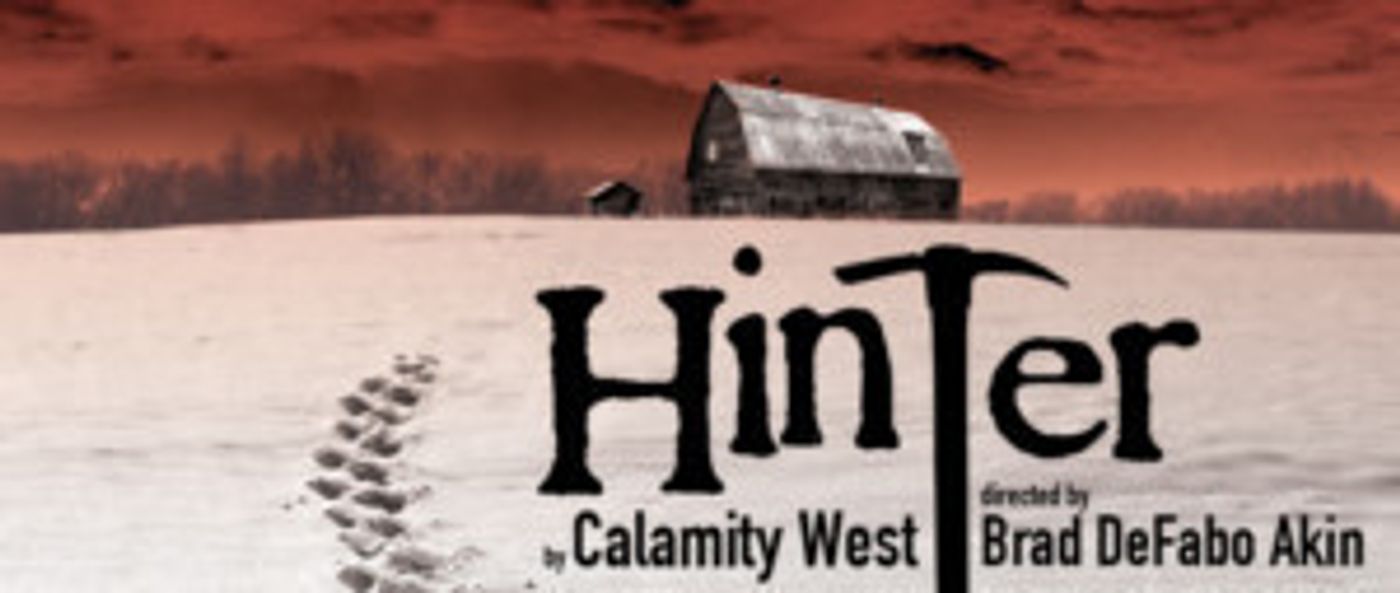Review Roundup: HINTER at Steep Theatre

Steep Theatre presents the world-premiere of Calamity West's new play, HINTER. The play was inspired by the Bavarian Hinterkaifeck murders, where six members of one household were brutally murdered in 1922. The case was never solved. HINTER delves into that mystery and attempts to piece together what may have really happened on that fateful night. HINTER opened on January 25th and will run through March 3rd.
HINTER features Aurora Adachi-Winter, Alex Gillmor, Peter Moore, Jim Poole, Melissa Riemer, Lauren Sivak, Sasha Smith, Sigrid Sutter, Nate Whelden and Eunice Woods.
The Creative Team: Brad DeFabo Akin (Director), Lauren Lassus (Stage Manager), Lauren Nigri (Set Designer), Pete Dully (Lighting Designer), Thomas Dixon (Sound Designer), Mieka van der Ploeg (Costume Designer), Kathryn Johnson (Props Designer), Sasha Smith (Violence & Intimacy Choreographer), Neena Arndt (Dramaturg), Almanya Narula (Assistant Director) and Catherine Allen (Production Manager).
Let's see what the critics had to say!
Chris Jones, Chicago Tribune: West is a colossal Chicago talent with a formidable intellect and a mass of swirling ideas in her brain - she is on the edge, I think, of a major breakout play, although not necessarily with this particular play, which is dense to the point of being very difficult to follow. I think the issue here is that West is taking too much knowledge on the part of the audience for granted; she wants to explore the various implications of the murders (apropos of gender, class and so on) without sufficiently telling the story of the murders themselves. Thus unless you have the details of the funky Hinterkaifeck business already top of mind, you're in a bit of a fog for the first part of the night. It might seem strange to similarly argue that director Brad DeFabo Akin's production is too grim and somber to work, given the topic of the play. But it's nonetheless true, especially since Steep weirdly is billing this piece as a dark comedy. That would be a dark comedy without any laughs. Alas, you just never feel like Akin, whose show feels very monochromatic and dour, successfully wrestled with the storytelling imperative. There is not enough dramatic tension; the show needs to pop more.
Marielle Shaw, Third Coast Review: So much of what's great about Hinter is in the reality of the situation. It may be Bavaria in the early 1900s but these women we meet could be any of us. Add to this the absolutely immaculate set design by Lauren Nigri and we feel like we've just somehow gotten a window into the past. The farmhouse, with its windows and simple dressings, is perfect for the action of the play-the central table the natural place for these things to play out. Adding to the dramatic tension is the lighting by light designer Pete Dully. Sunshine streams through windows, signifying the end of a long and horrifying night. Candlelight flickers. Darkness and light become almost a character in the drama. I found myself searching the program to find out just who'd mastered this so beautifully. If there was a complaint about incidentals it would simply be that the interstitial audio was jarringly loud, but even as I mention that I find that it wasn't too troublesome. Hinter is one of the best plays I've seen in the past year. It's incredibly impactful, with dynamic characters that don't need to tell you who they are with words. The mystery is so compelling as to make you wish there wasn't an intermission so you can find out more about what happened and why, and the set and lighting transport you to another place fully and effortlessly. It's worth your time to head to Steep Theatre and catch Hinter during its world premiere run.
Justin Hayford, Chicago Reader: Still, West has assembled potent incidents into an explosive mix, as is her wont. But the script's bifurcated structure short-circuits the whole affair. West sets act one just after the murders and act two just before, switching the focus to new characters after intermission, resetting the dramatic course, and dropping almost everything set up for payoff in the first half. In essence, she's created separate halves of different plays. And the conclusion brings little meaningful resolution. Just as problematic, director Brad DeFabo Akin doesn't capitalize on the script's strengths. Rather than establishing a stage world of unsettling peculiarity, he's created one of stilted disjointedness. The characters relate to one another as relative strangers rather than as lifelong inhabitants of shared isolation. It's hard to discern who these people are to one other, and thus their collective stake in the tragedy never comes into focus.
Mary Shen Barnidge, Windy City Times: The tiny Steep Theatre performance space succeeds in suggesting the bleak landscape just outside the kitchen ( which assumes the ambience of a prison cell ). Combined with the emotional intensity displayed by Brad DeFabo Akin's direction of a laser-focused cast, the suspense generated as each clue surfaces is as provocative as it is persistent.
Katy Walsh, The Fourth Walsh: Director Brad DeFabo Akin keeps the mystery riveting. Peter Moore is an unorthodox investigator from Munich. Moore's techniques are unhinging. He humorously rattles the locals with his peculiar line of questioning. Later, he disturbingly plunges his hands into the dead corpses. The reactions of an earnest Lauren Sivak (Frieda), a wary Sigrid Sutter (Klara), and a detached Sasha Smith (Elizabeth) to each other and the deceased adds to the intrigue. Sutter, in particularly, seems up-to-no-good as she snoops around the house. The confrontation between her and Moore is unsettling. In act 2, Sutter's revealed motivation is surprising. Despite all the dark horrors surrounding them, Sivak's ongoing devotion to Smith has this charming simplicity. It gives us a subtle glimpse into the loneliness of this isolated area.
Photo Courtesy of Steep Theatre.
Reader Reviews

Videos

